Leadership and Management: Theories and Practices in Service Sector
VerifiedAdded on 2023/01/11
|12
|3449
|23
Report
AI Summary
This report provides a comprehensive analysis of leadership and management within the service industry, using the Queens Park Hotel as a case study. It begins by assessing classical management theories, such as Taylor's scientific management and Fayol's administrative theory, and their application within the hotel context. The report then explores various leadership styles, including autocratic and participative approaches, and examines the roles of leaders as change agents, integrators, and strategists. Furthermore, it reviews the management and leadership styles employed by the Queens Park Hotel, highlighting the significance of internal factors like employee relations and organizational culture, as well as external factors such as digital disruption, in influencing management practices. The report also assesses current and future management skills, emphasizing the importance of both 'hard' and 'soft' skills in the service sector. The report concludes with a discussion of the skills necessary for future management success in the service industry.
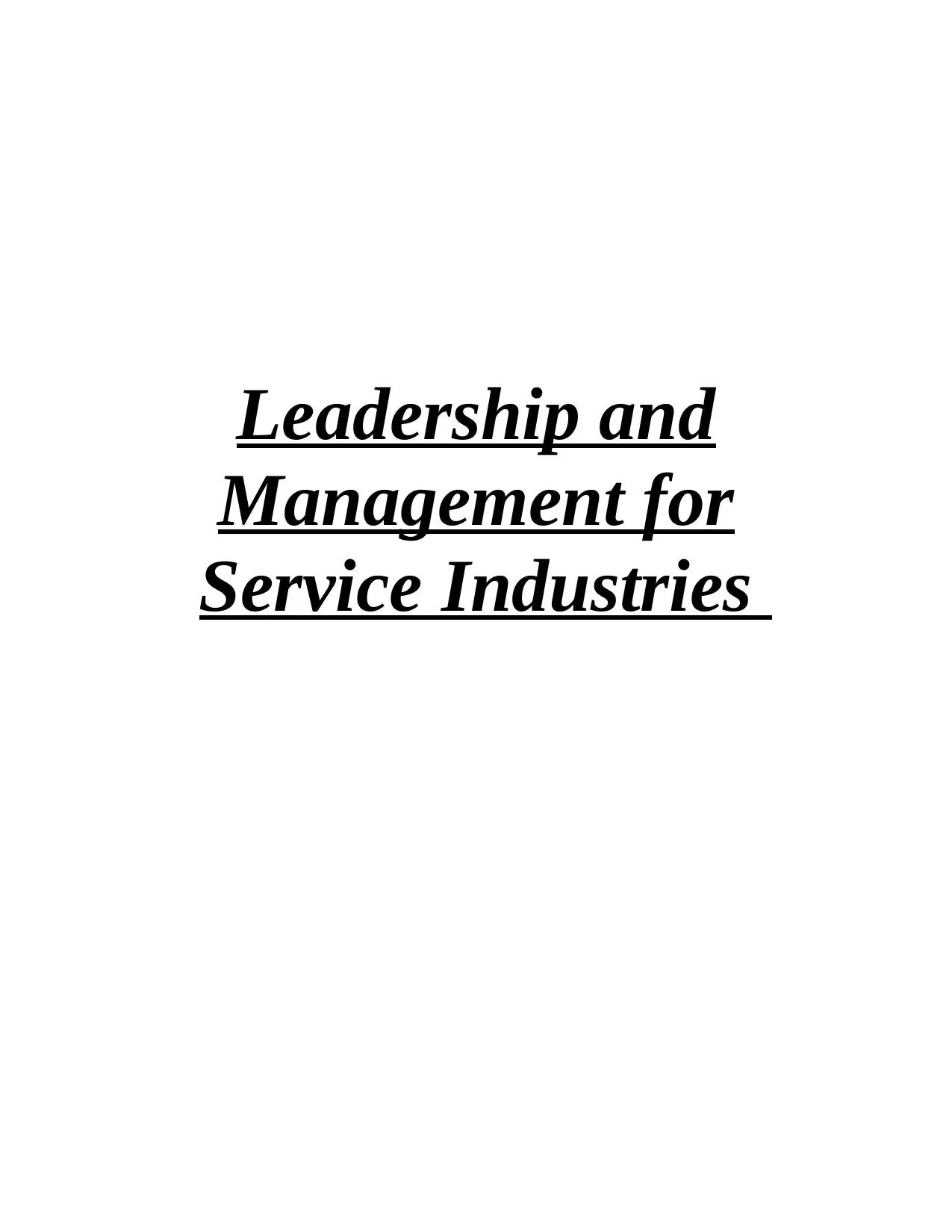
Leadership and
Management for
Service Industries
Management for
Service Industries
Paraphrase This Document
Need a fresh take? Get an instant paraphrase of this document with our AI Paraphraser
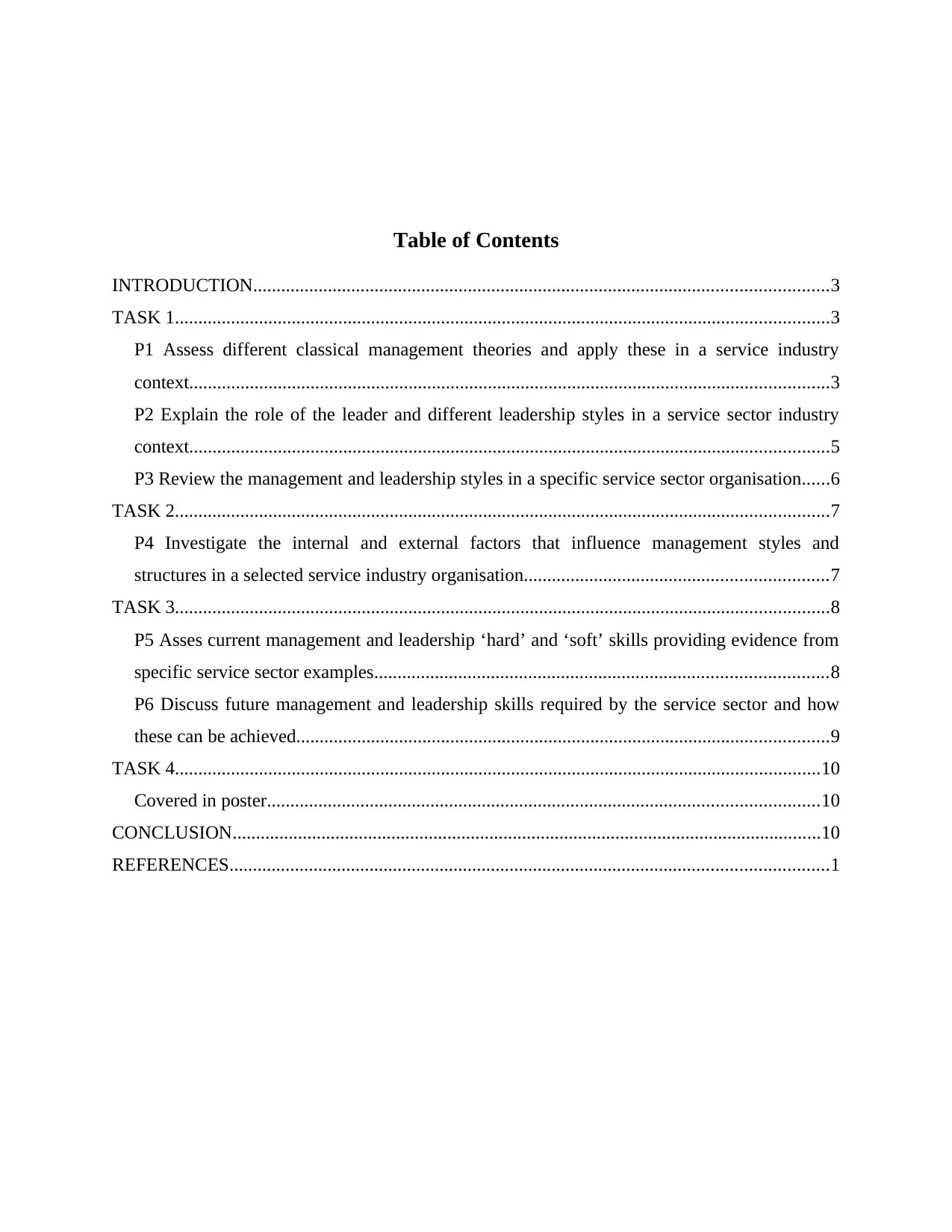
Table of Contents
INTRODUCTION...........................................................................................................................3
TASK 1............................................................................................................................................3
P1 Assess different classical management theories and apply these in a service industry
context.........................................................................................................................................3
P2 Explain the role of the leader and different leadership styles in a service sector industry
context.........................................................................................................................................5
P3 Review the management and leadership styles in a specific service sector organisation......6
TASK 2............................................................................................................................................7
P4 Investigate the internal and external factors that influence management styles and
structures in a selected service industry organisation.................................................................7
TASK 3............................................................................................................................................8
P5 Asses current management and leadership ‘hard’ and ‘soft’ skills providing evidence from
specific service sector examples.................................................................................................8
P6 Discuss future management and leadership skills required by the service sector and how
these can be achieved..................................................................................................................9
TASK 4..........................................................................................................................................10
Covered in poster......................................................................................................................10
CONCLUSION..............................................................................................................................10
REFERENCES................................................................................................................................1
INTRODUCTION...........................................................................................................................3
TASK 1............................................................................................................................................3
P1 Assess different classical management theories and apply these in a service industry
context.........................................................................................................................................3
P2 Explain the role of the leader and different leadership styles in a service sector industry
context.........................................................................................................................................5
P3 Review the management and leadership styles in a specific service sector organisation......6
TASK 2............................................................................................................................................7
P4 Investigate the internal and external factors that influence management styles and
structures in a selected service industry organisation.................................................................7
TASK 3............................................................................................................................................8
P5 Asses current management and leadership ‘hard’ and ‘soft’ skills providing evidence from
specific service sector examples.................................................................................................8
P6 Discuss future management and leadership skills required by the service sector and how
these can be achieved..................................................................................................................9
TASK 4..........................................................................................................................................10
Covered in poster......................................................................................................................10
CONCLUSION..............................................................................................................................10
REFERENCES................................................................................................................................1
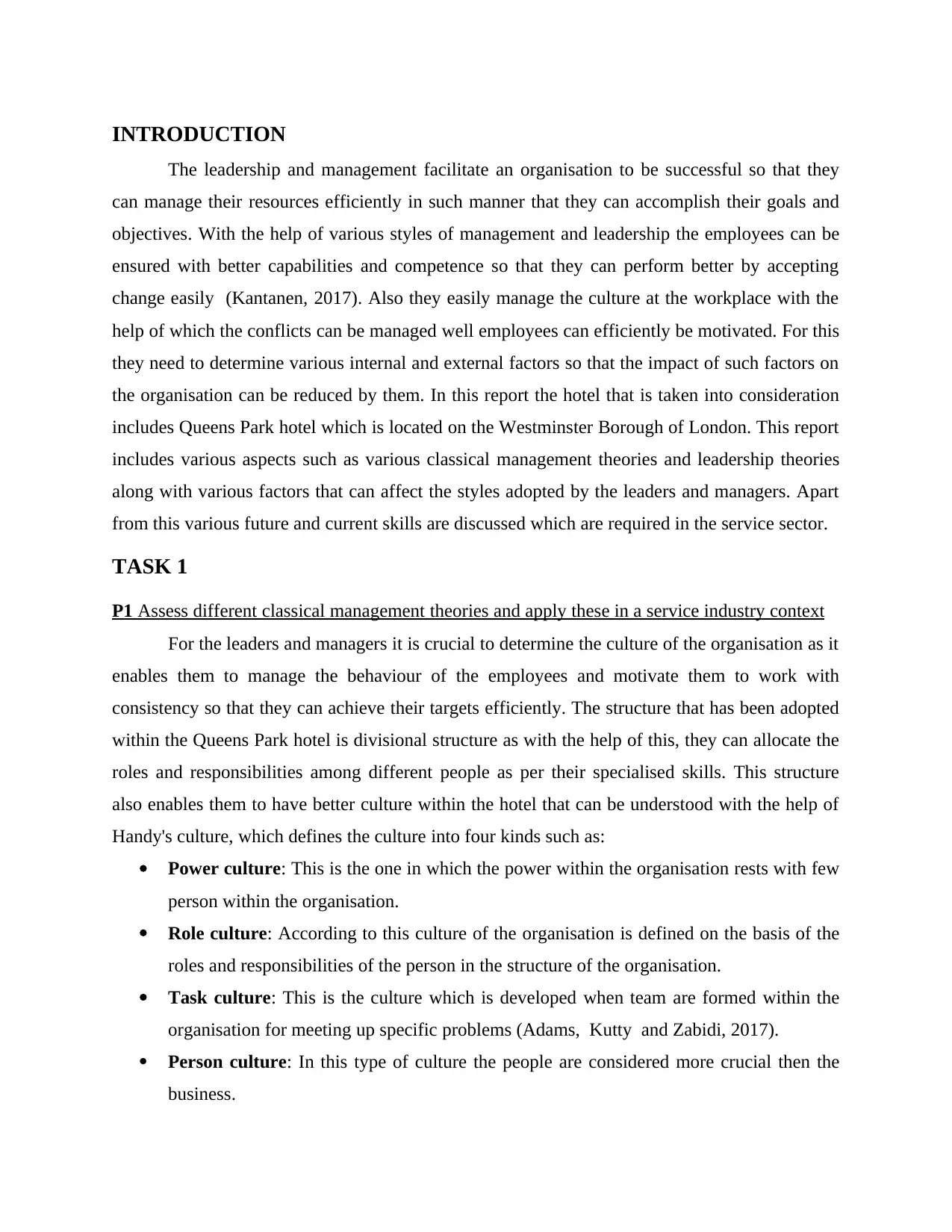
INTRODUCTION
The leadership and management facilitate an organisation to be successful so that they
can manage their resources efficiently in such manner that they can accomplish their goals and
objectives. With the help of various styles of management and leadership the employees can be
ensured with better capabilities and competence so that they can perform better by accepting
change easily (Kantanen, 2017). Also they easily manage the culture at the workplace with the
help of which the conflicts can be managed well employees can efficiently be motivated. For this
they need to determine various internal and external factors so that the impact of such factors on
the organisation can be reduced by them. In this report the hotel that is taken into consideration
includes Queens Park hotel which is located on the Westminster Borough of London. This report
includes various aspects such as various classical management theories and leadership theories
along with various factors that can affect the styles adopted by the leaders and managers. Apart
from this various future and current skills are discussed which are required in the service sector.
TASK 1
P1 Assess different classical management theories and apply these in a service industry context
For the leaders and managers it is crucial to determine the culture of the organisation as it
enables them to manage the behaviour of the employees and motivate them to work with
consistency so that they can achieve their targets efficiently. The structure that has been adopted
within the Queens Park hotel is divisional structure as with the help of this, they can allocate the
roles and responsibilities among different people as per their specialised skills. This structure
also enables them to have better culture within the hotel that can be understood with the help of
Handy's culture, which defines the culture into four kinds such as:
Power culture: This is the one in which the power within the organisation rests with few
person within the organisation.
Role culture: According to this culture of the organisation is defined on the basis of the
roles and responsibilities of the person in the structure of the organisation.
Task culture: This is the culture which is developed when team are formed within the
organisation for meeting up specific problems (Adams, Kutty and Zabidi, 2017).
Person culture: In this type of culture the people are considered more crucial then the
business.
The leadership and management facilitate an organisation to be successful so that they
can manage their resources efficiently in such manner that they can accomplish their goals and
objectives. With the help of various styles of management and leadership the employees can be
ensured with better capabilities and competence so that they can perform better by accepting
change easily (Kantanen, 2017). Also they easily manage the culture at the workplace with the
help of which the conflicts can be managed well employees can efficiently be motivated. For this
they need to determine various internal and external factors so that the impact of such factors on
the organisation can be reduced by them. In this report the hotel that is taken into consideration
includes Queens Park hotel which is located on the Westminster Borough of London. This report
includes various aspects such as various classical management theories and leadership theories
along with various factors that can affect the styles adopted by the leaders and managers. Apart
from this various future and current skills are discussed which are required in the service sector.
TASK 1
P1 Assess different classical management theories and apply these in a service industry context
For the leaders and managers it is crucial to determine the culture of the organisation as it
enables them to manage the behaviour of the employees and motivate them to work with
consistency so that they can achieve their targets efficiently. The structure that has been adopted
within the Queens Park hotel is divisional structure as with the help of this, they can allocate the
roles and responsibilities among different people as per their specialised skills. This structure
also enables them to have better culture within the hotel that can be understood with the help of
Handy's culture, which defines the culture into four kinds such as:
Power culture: This is the one in which the power within the organisation rests with few
person within the organisation.
Role culture: According to this culture of the organisation is defined on the basis of the
roles and responsibilities of the person in the structure of the organisation.
Task culture: This is the culture which is developed when team are formed within the
organisation for meeting up specific problems (Adams, Kutty and Zabidi, 2017).
Person culture: In this type of culture the people are considered more crucial then the
business.
⊘ This is a preview!⊘
Do you want full access?
Subscribe today to unlock all pages.

Trusted by 1+ million students worldwide
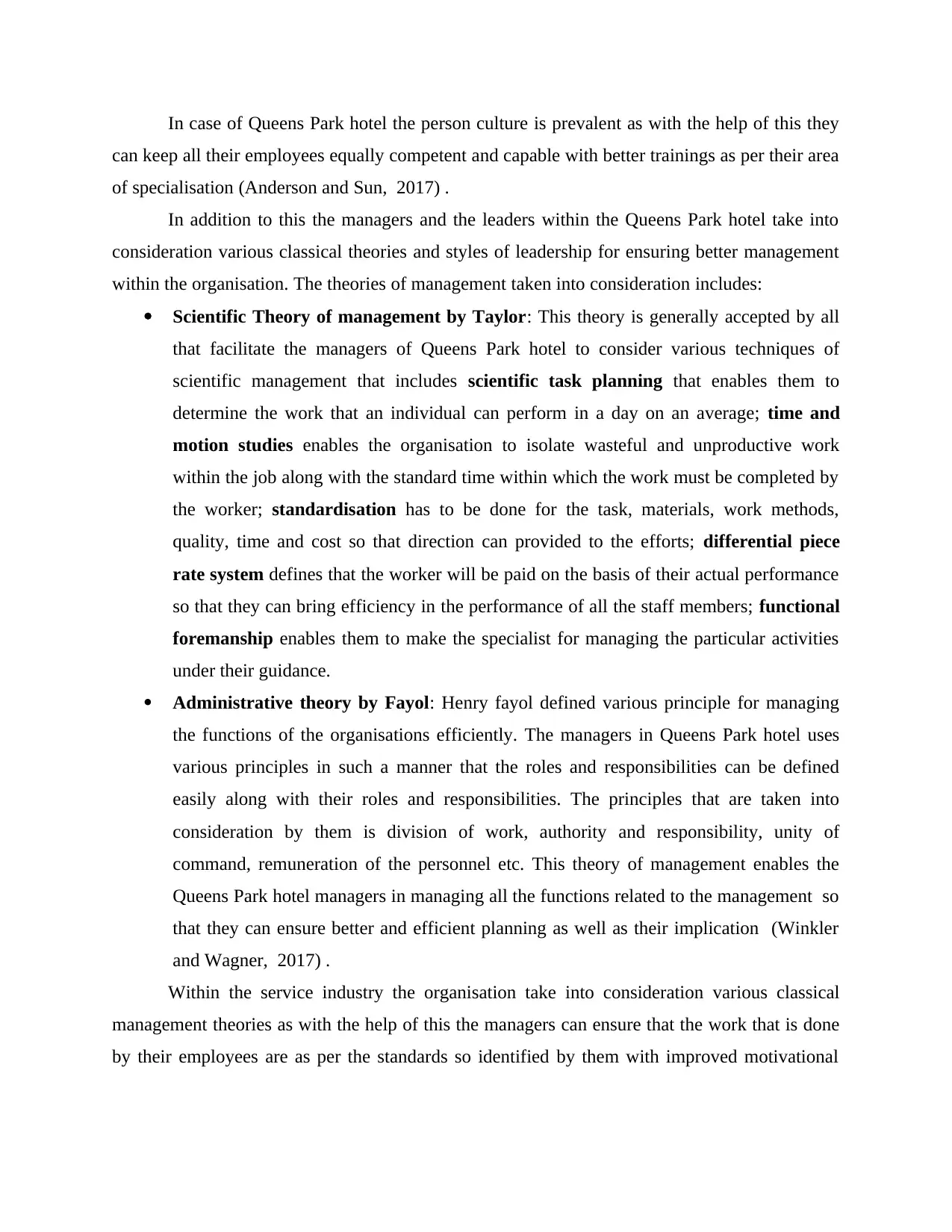
In case of Queens Park hotel the person culture is prevalent as with the help of this they
can keep all their employees equally competent and capable with better trainings as per their area
of specialisation (Anderson and Sun, 2017) .
In addition to this the managers and the leaders within the Queens Park hotel take into
consideration various classical theories and styles of leadership for ensuring better management
within the organisation. The theories of management taken into consideration includes:
Scientific Theory of management by Taylor: This theory is generally accepted by all
that facilitate the managers of Queens Park hotel to consider various techniques of
scientific management that includes scientific task planning that enables them to
determine the work that an individual can perform in a day on an average; time and
motion studies enables the organisation to isolate wasteful and unproductive work
within the job along with the standard time within which the work must be completed by
the worker; standardisation has to be done for the task, materials, work methods,
quality, time and cost so that direction can provided to the efforts; differential piece
rate system defines that the worker will be paid on the basis of their actual performance
so that they can bring efficiency in the performance of all the staff members; functional
foremanship enables them to make the specialist for managing the particular activities
under their guidance.
Administrative theory by Fayol: Henry fayol defined various principle for managing
the functions of the organisations efficiently. The managers in Queens Park hotel uses
various principles in such a manner that the roles and responsibilities can be defined
easily along with their roles and responsibilities. The principles that are taken into
consideration by them is division of work, authority and responsibility, unity of
command, remuneration of the personnel etc. This theory of management enables the
Queens Park hotel managers in managing all the functions related to the management so
that they can ensure better and efficient planning as well as their implication (Winkler
and Wagner, 2017) .
Within the service industry the organisation take into consideration various classical
management theories as with the help of this the managers can ensure that the work that is done
by their employees are as per the standards so identified by them with improved motivational
can keep all their employees equally competent and capable with better trainings as per their area
of specialisation (Anderson and Sun, 2017) .
In addition to this the managers and the leaders within the Queens Park hotel take into
consideration various classical theories and styles of leadership for ensuring better management
within the organisation. The theories of management taken into consideration includes:
Scientific Theory of management by Taylor: This theory is generally accepted by all
that facilitate the managers of Queens Park hotel to consider various techniques of
scientific management that includes scientific task planning that enables them to
determine the work that an individual can perform in a day on an average; time and
motion studies enables the organisation to isolate wasteful and unproductive work
within the job along with the standard time within which the work must be completed by
the worker; standardisation has to be done for the task, materials, work methods,
quality, time and cost so that direction can provided to the efforts; differential piece
rate system defines that the worker will be paid on the basis of their actual performance
so that they can bring efficiency in the performance of all the staff members; functional
foremanship enables them to make the specialist for managing the particular activities
under their guidance.
Administrative theory by Fayol: Henry fayol defined various principle for managing
the functions of the organisations efficiently. The managers in Queens Park hotel uses
various principles in such a manner that the roles and responsibilities can be defined
easily along with their roles and responsibilities. The principles that are taken into
consideration by them is division of work, authority and responsibility, unity of
command, remuneration of the personnel etc. This theory of management enables the
Queens Park hotel managers in managing all the functions related to the management so
that they can ensure better and efficient planning as well as their implication (Winkler
and Wagner, 2017) .
Within the service industry the organisation take into consideration various classical
management theories as with the help of this the managers can ensure that the work that is done
by their employees are as per the standards so identified by them with improved motivational
Paraphrase This Document
Need a fresh take? Get an instant paraphrase of this document with our AI Paraphraser
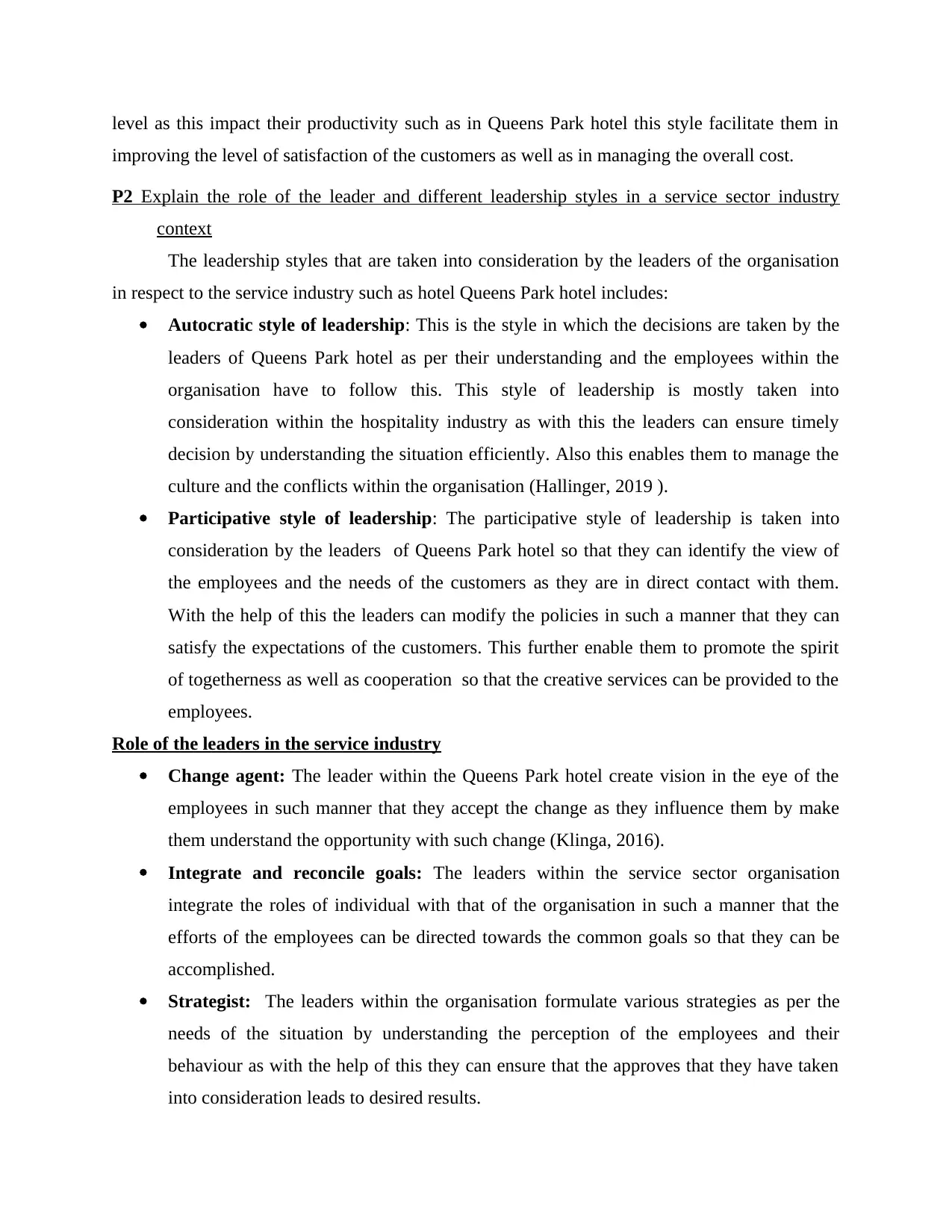
level as this impact their productivity such as in Queens Park hotel this style facilitate them in
improving the level of satisfaction of the customers as well as in managing the overall cost.
P2 Explain the role of the leader and different leadership styles in a service sector industry
context
The leadership styles that are taken into consideration by the leaders of the organisation
in respect to the service industry such as hotel Queens Park hotel includes:
Autocratic style of leadership: This is the style in which the decisions are taken by the
leaders of Queens Park hotel as per their understanding and the employees within the
organisation have to follow this. This style of leadership is mostly taken into
consideration within the hospitality industry as with this the leaders can ensure timely
decision by understanding the situation efficiently. Also this enables them to manage the
culture and the conflicts within the organisation (Hallinger, 2019 ).
Participative style of leadership: The participative style of leadership is taken into
consideration by the leaders of Queens Park hotel so that they can identify the view of
the employees and the needs of the customers as they are in direct contact with them.
With the help of this the leaders can modify the policies in such a manner that they can
satisfy the expectations of the customers. This further enable them to promote the spirit
of togetherness as well as cooperation so that the creative services can be provided to the
employees.
Role of the leaders in the service industry
Change agent: The leader within the Queens Park hotel create vision in the eye of the
employees in such manner that they accept the change as they influence them by make
them understand the opportunity with such change (Klinga, 2016).
Integrate and reconcile goals: The leaders within the service sector organisation
integrate the roles of individual with that of the organisation in such a manner that the
efforts of the employees can be directed towards the common goals so that they can be
accomplished.
Strategist: The leaders within the organisation formulate various strategies as per the
needs of the situation by understanding the perception of the employees and their
behaviour as with the help of this they can ensure that the approves that they have taken
into consideration leads to desired results.
improving the level of satisfaction of the customers as well as in managing the overall cost.
P2 Explain the role of the leader and different leadership styles in a service sector industry
context
The leadership styles that are taken into consideration by the leaders of the organisation
in respect to the service industry such as hotel Queens Park hotel includes:
Autocratic style of leadership: This is the style in which the decisions are taken by the
leaders of Queens Park hotel as per their understanding and the employees within the
organisation have to follow this. This style of leadership is mostly taken into
consideration within the hospitality industry as with this the leaders can ensure timely
decision by understanding the situation efficiently. Also this enables them to manage the
culture and the conflicts within the organisation (Hallinger, 2019 ).
Participative style of leadership: The participative style of leadership is taken into
consideration by the leaders of Queens Park hotel so that they can identify the view of
the employees and the needs of the customers as they are in direct contact with them.
With the help of this the leaders can modify the policies in such a manner that they can
satisfy the expectations of the customers. This further enable them to promote the spirit
of togetherness as well as cooperation so that the creative services can be provided to the
employees.
Role of the leaders in the service industry
Change agent: The leader within the Queens Park hotel create vision in the eye of the
employees in such manner that they accept the change as they influence them by make
them understand the opportunity with such change (Klinga, 2016).
Integrate and reconcile goals: The leaders within the service sector organisation
integrate the roles of individual with that of the organisation in such a manner that the
efforts of the employees can be directed towards the common goals so that they can be
accomplished.
Strategist: The leaders within the organisation formulate various strategies as per the
needs of the situation by understanding the perception of the employees and their
behaviour as with the help of this they can ensure that the approves that they have taken
into consideration leads to desired results.
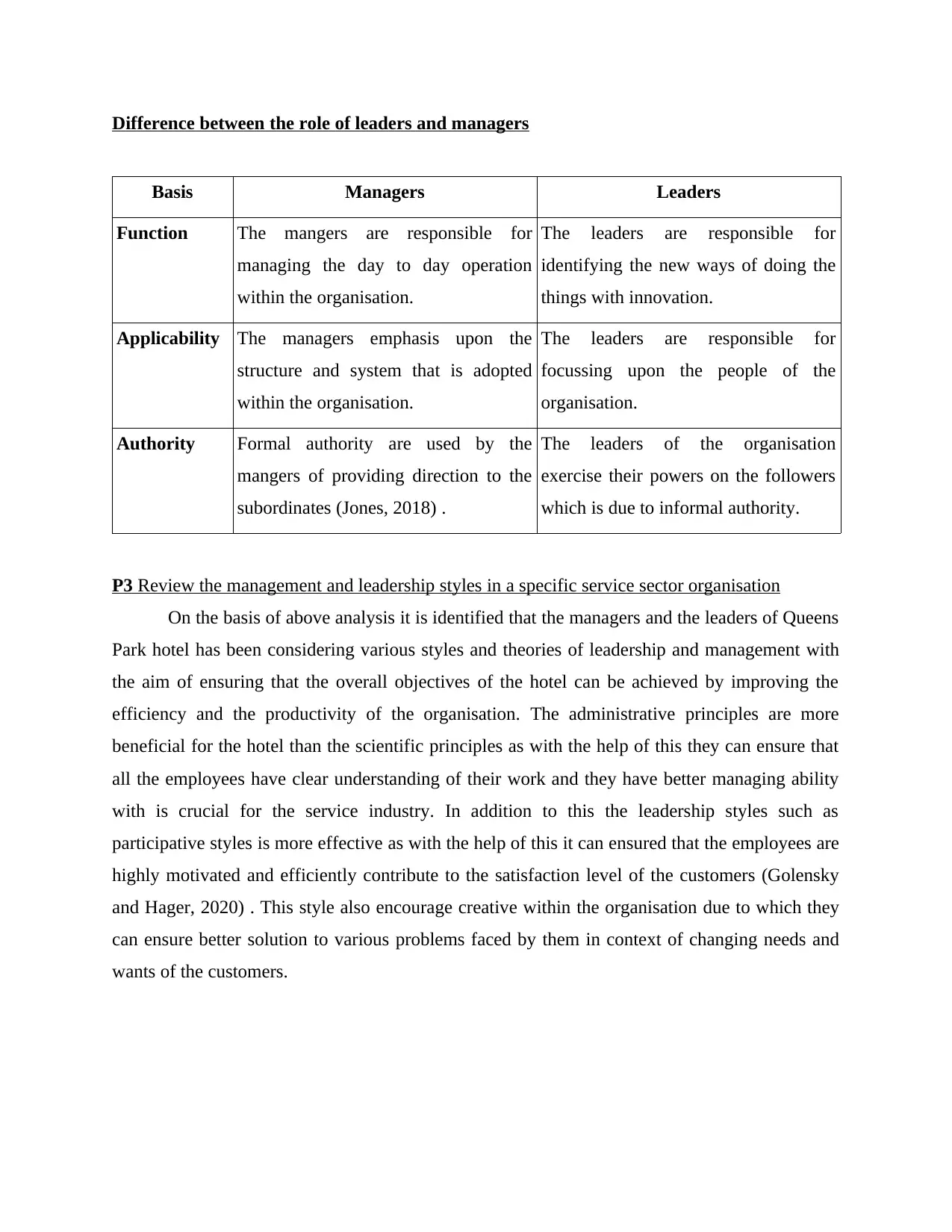
Difference between the role of leaders and managers
Basis Managers Leaders
Function The mangers are responsible for
managing the day to day operation
within the organisation.
The leaders are responsible for
identifying the new ways of doing the
things with innovation.
Applicability The managers emphasis upon the
structure and system that is adopted
within the organisation.
The leaders are responsible for
focussing upon the people of the
organisation.
Authority Formal authority are used by the
mangers of providing direction to the
subordinates (Jones, 2018) .
The leaders of the organisation
exercise their powers on the followers
which is due to informal authority.
P3 Review the management and leadership styles in a specific service sector organisation
On the basis of above analysis it is identified that the managers and the leaders of Queens
Park hotel has been considering various styles and theories of leadership and management with
the aim of ensuring that the overall objectives of the hotel can be achieved by improving the
efficiency and the productivity of the organisation. The administrative principles are more
beneficial for the hotel than the scientific principles as with the help of this they can ensure that
all the employees have clear understanding of their work and they have better managing ability
with is crucial for the service industry. In addition to this the leadership styles such as
participative styles is more effective as with the help of this it can ensured that the employees are
highly motivated and efficiently contribute to the satisfaction level of the customers (Golensky
and Hager, 2020) . This style also encourage creative within the organisation due to which they
can ensure better solution to various problems faced by them in context of changing needs and
wants of the customers.
Basis Managers Leaders
Function The mangers are responsible for
managing the day to day operation
within the organisation.
The leaders are responsible for
identifying the new ways of doing the
things with innovation.
Applicability The managers emphasis upon the
structure and system that is adopted
within the organisation.
The leaders are responsible for
focussing upon the people of the
organisation.
Authority Formal authority are used by the
mangers of providing direction to the
subordinates (Jones, 2018) .
The leaders of the organisation
exercise their powers on the followers
which is due to informal authority.
P3 Review the management and leadership styles in a specific service sector organisation
On the basis of above analysis it is identified that the managers and the leaders of Queens
Park hotel has been considering various styles and theories of leadership and management with
the aim of ensuring that the overall objectives of the hotel can be achieved by improving the
efficiency and the productivity of the organisation. The administrative principles are more
beneficial for the hotel than the scientific principles as with the help of this they can ensure that
all the employees have clear understanding of their work and they have better managing ability
with is crucial for the service industry. In addition to this the leadership styles such as
participative styles is more effective as with the help of this it can ensured that the employees are
highly motivated and efficiently contribute to the satisfaction level of the customers (Golensky
and Hager, 2020) . This style also encourage creative within the organisation due to which they
can ensure better solution to various problems faced by them in context of changing needs and
wants of the customers.
⊘ This is a preview!⊘
Do you want full access?
Subscribe today to unlock all pages.

Trusted by 1+ million students worldwide
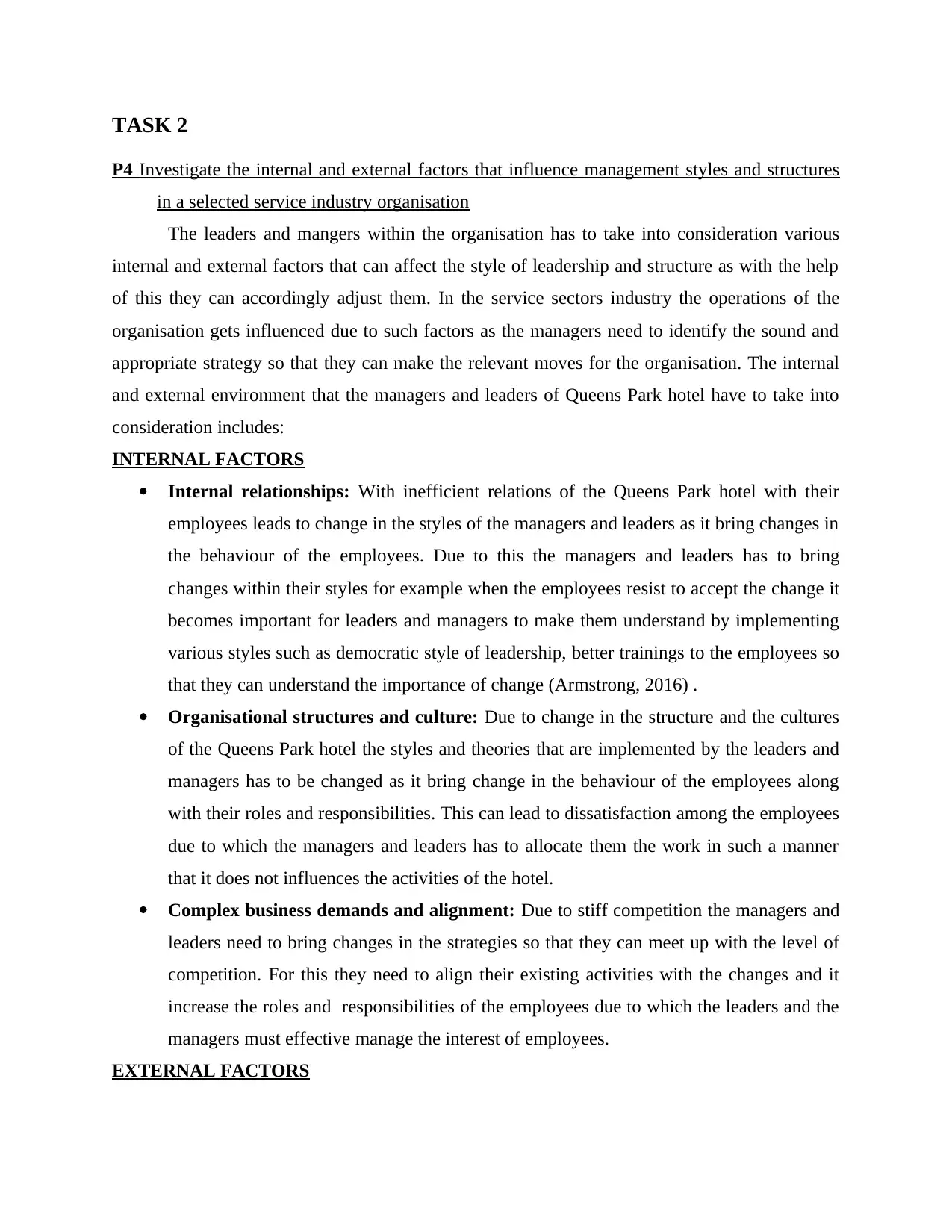
TASK 2
P4 Investigate the internal and external factors that influence management styles and structures
in a selected service industry organisation
The leaders and mangers within the organisation has to take into consideration various
internal and external factors that can affect the style of leadership and structure as with the help
of this they can accordingly adjust them. In the service sectors industry the operations of the
organisation gets influenced due to such factors as the managers need to identify the sound and
appropriate strategy so that they can make the relevant moves for the organisation. The internal
and external environment that the managers and leaders of Queens Park hotel have to take into
consideration includes:
INTERNAL FACTORS
Internal relationships: With inefficient relations of the Queens Park hotel with their
employees leads to change in the styles of the managers and leaders as it bring changes in
the behaviour of the employees. Due to this the managers and leaders has to bring
changes within their styles for example when the employees resist to accept the change it
becomes important for leaders and managers to make them understand by implementing
various styles such as democratic style of leadership, better trainings to the employees so
that they can understand the importance of change (Armstrong, 2016) .
Organisational structures and culture: Due to change in the structure and the cultures
of the Queens Park hotel the styles and theories that are implemented by the leaders and
managers has to be changed as it bring change in the behaviour of the employees along
with their roles and responsibilities. This can lead to dissatisfaction among the employees
due to which the managers and leaders has to allocate them the work in such a manner
that it does not influences the activities of the hotel.
Complex business demands and alignment: Due to stiff competition the managers and
leaders need to bring changes in the strategies so that they can meet up with the level of
competition. For this they need to align their existing activities with the changes and it
increase the roles and responsibilities of the employees due to which the leaders and the
managers must effective manage the interest of employees.
EXTERNAL FACTORS
P4 Investigate the internal and external factors that influence management styles and structures
in a selected service industry organisation
The leaders and mangers within the organisation has to take into consideration various
internal and external factors that can affect the style of leadership and structure as with the help
of this they can accordingly adjust them. In the service sectors industry the operations of the
organisation gets influenced due to such factors as the managers need to identify the sound and
appropriate strategy so that they can make the relevant moves for the organisation. The internal
and external environment that the managers and leaders of Queens Park hotel have to take into
consideration includes:
INTERNAL FACTORS
Internal relationships: With inefficient relations of the Queens Park hotel with their
employees leads to change in the styles of the managers and leaders as it bring changes in
the behaviour of the employees. Due to this the managers and leaders has to bring
changes within their styles for example when the employees resist to accept the change it
becomes important for leaders and managers to make them understand by implementing
various styles such as democratic style of leadership, better trainings to the employees so
that they can understand the importance of change (Armstrong, 2016) .
Organisational structures and culture: Due to change in the structure and the cultures
of the Queens Park hotel the styles and theories that are implemented by the leaders and
managers has to be changed as it bring change in the behaviour of the employees along
with their roles and responsibilities. This can lead to dissatisfaction among the employees
due to which the managers and leaders has to allocate them the work in such a manner
that it does not influences the activities of the hotel.
Complex business demands and alignment: Due to stiff competition the managers and
leaders need to bring changes in the strategies so that they can meet up with the level of
competition. For this they need to align their existing activities with the changes and it
increase the roles and responsibilities of the employees due to which the leaders and the
managers must effective manage the interest of employees.
EXTERNAL FACTORS
Paraphrase This Document
Need a fresh take? Get an instant paraphrase of this document with our AI Paraphraser
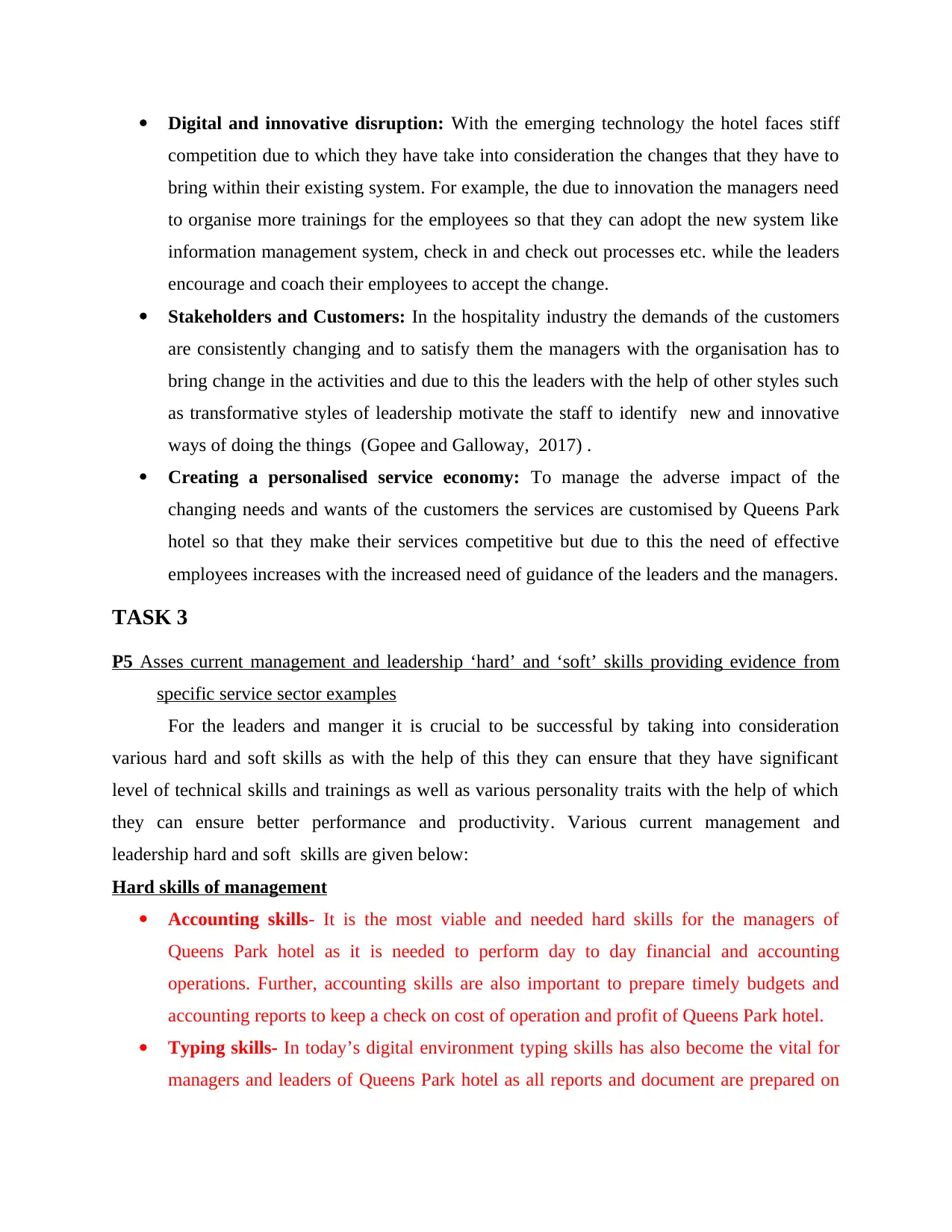
Digital and innovative disruption: With the emerging technology the hotel faces stiff
competition due to which they have take into consideration the changes that they have to
bring within their existing system. For example, the due to innovation the managers need
to organise more trainings for the employees so that they can adopt the new system like
information management system, check in and check out processes etc. while the leaders
encourage and coach their employees to accept the change.
Stakeholders and Customers: In the hospitality industry the demands of the customers
are consistently changing and to satisfy them the managers with the organisation has to
bring change in the activities and due to this the leaders with the help of other styles such
as transformative styles of leadership motivate the staff to identify new and innovative
ways of doing the things (Gopee and Galloway, 2017) .
Creating a personalised service economy: To manage the adverse impact of the
changing needs and wants of the customers the services are customised by Queens Park
hotel so that they make their services competitive but due to this the need of effective
employees increases with the increased need of guidance of the leaders and the managers.
TASK 3
P5 Asses current management and leadership ‘hard’ and ‘soft’ skills providing evidence from
specific service sector examples
For the leaders and manger it is crucial to be successful by taking into consideration
various hard and soft skills as with the help of this they can ensure that they have significant
level of technical skills and trainings as well as various personality traits with the help of which
they can ensure better performance and productivity. Various current management and
leadership hard and soft skills are given below:
Hard skills of management
Accounting skills- It is the most viable and needed hard skills for the managers of
Queens Park hotel as it is needed to perform day to day financial and accounting
operations. Further, accounting skills are also important to prepare timely budgets and
accounting reports to keep a check on cost of operation and profit of Queens Park hotel.
Typing skills- In today’s digital environment typing skills has also become the vital for
managers and leaders of Queens Park hotel as all reports and document are prepared on
competition due to which they have take into consideration the changes that they have to
bring within their existing system. For example, the due to innovation the managers need
to organise more trainings for the employees so that they can adopt the new system like
information management system, check in and check out processes etc. while the leaders
encourage and coach their employees to accept the change.
Stakeholders and Customers: In the hospitality industry the demands of the customers
are consistently changing and to satisfy them the managers with the organisation has to
bring change in the activities and due to this the leaders with the help of other styles such
as transformative styles of leadership motivate the staff to identify new and innovative
ways of doing the things (Gopee and Galloway, 2017) .
Creating a personalised service economy: To manage the adverse impact of the
changing needs and wants of the customers the services are customised by Queens Park
hotel so that they make their services competitive but due to this the need of effective
employees increases with the increased need of guidance of the leaders and the managers.
TASK 3
P5 Asses current management and leadership ‘hard’ and ‘soft’ skills providing evidence from
specific service sector examples
For the leaders and manger it is crucial to be successful by taking into consideration
various hard and soft skills as with the help of this they can ensure that they have significant
level of technical skills and trainings as well as various personality traits with the help of which
they can ensure better performance and productivity. Various current management and
leadership hard and soft skills are given below:
Hard skills of management
Accounting skills- It is the most viable and needed hard skills for the managers of
Queens Park hotel as it is needed to perform day to day financial and accounting
operations. Further, accounting skills are also important to prepare timely budgets and
accounting reports to keep a check on cost of operation and profit of Queens Park hotel.
Typing skills- In today’s digital environment typing skills has also become the vital for
managers and leaders of Queens Park hotel as all reports and document are prepared on
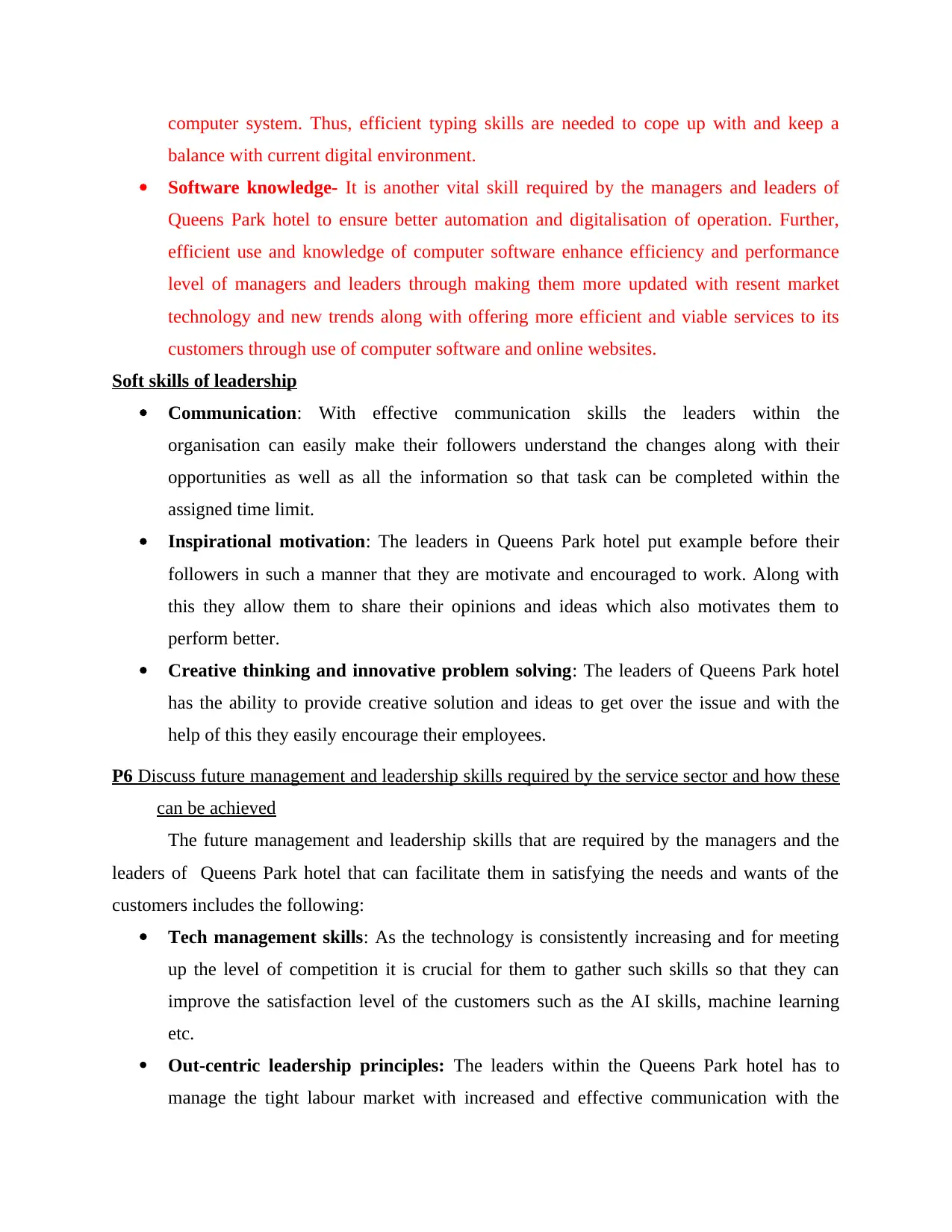
computer system. Thus, efficient typing skills are needed to cope up with and keep a
balance with current digital environment.
Software knowledge- It is another vital skill required by the managers and leaders of
Queens Park hotel to ensure better automation and digitalisation of operation. Further,
efficient use and knowledge of computer software enhance efficiency and performance
level of managers and leaders through making them more updated with resent market
technology and new trends along with offering more efficient and viable services to its
customers through use of computer software and online websites.
Soft skills of leadership
Communication: With effective communication skills the leaders within the
organisation can easily make their followers understand the changes along with their
opportunities as well as all the information so that task can be completed within the
assigned time limit.
Inspirational motivation: The leaders in Queens Park hotel put example before their
followers in such a manner that they are motivate and encouraged to work. Along with
this they allow them to share their opinions and ideas which also motivates them to
perform better.
Creative thinking and innovative problem solving: The leaders of Queens Park hotel
has the ability to provide creative solution and ideas to get over the issue and with the
help of this they easily encourage their employees.
P6 Discuss future management and leadership skills required by the service sector and how these
can be achieved
The future management and leadership skills that are required by the managers and the
leaders of Queens Park hotel that can facilitate them in satisfying the needs and wants of the
customers includes the following:
Tech management skills: As the technology is consistently increasing and for meeting
up the level of competition it is crucial for them to gather such skills so that they can
improve the satisfaction level of the customers such as the AI skills, machine learning
etc.
Out-centric leadership principles: The leaders within the Queens Park hotel has to
manage the tight labour market with increased and effective communication with the
balance with current digital environment.
Software knowledge- It is another vital skill required by the managers and leaders of
Queens Park hotel to ensure better automation and digitalisation of operation. Further,
efficient use and knowledge of computer software enhance efficiency and performance
level of managers and leaders through making them more updated with resent market
technology and new trends along with offering more efficient and viable services to its
customers through use of computer software and online websites.
Soft skills of leadership
Communication: With effective communication skills the leaders within the
organisation can easily make their followers understand the changes along with their
opportunities as well as all the information so that task can be completed within the
assigned time limit.
Inspirational motivation: The leaders in Queens Park hotel put example before their
followers in such a manner that they are motivate and encouraged to work. Along with
this they allow them to share their opinions and ideas which also motivates them to
perform better.
Creative thinking and innovative problem solving: The leaders of Queens Park hotel
has the ability to provide creative solution and ideas to get over the issue and with the
help of this they easily encourage their employees.
P6 Discuss future management and leadership skills required by the service sector and how these
can be achieved
The future management and leadership skills that are required by the managers and the
leaders of Queens Park hotel that can facilitate them in satisfying the needs and wants of the
customers includes the following:
Tech management skills: As the technology is consistently increasing and for meeting
up the level of competition it is crucial for them to gather such skills so that they can
improve the satisfaction level of the customers such as the AI skills, machine learning
etc.
Out-centric leadership principles: The leaders within the Queens Park hotel has to
manage the tight labour market with increased and effective communication with the
⊘ This is a preview!⊘
Do you want full access?
Subscribe today to unlock all pages.

Trusted by 1+ million students worldwide
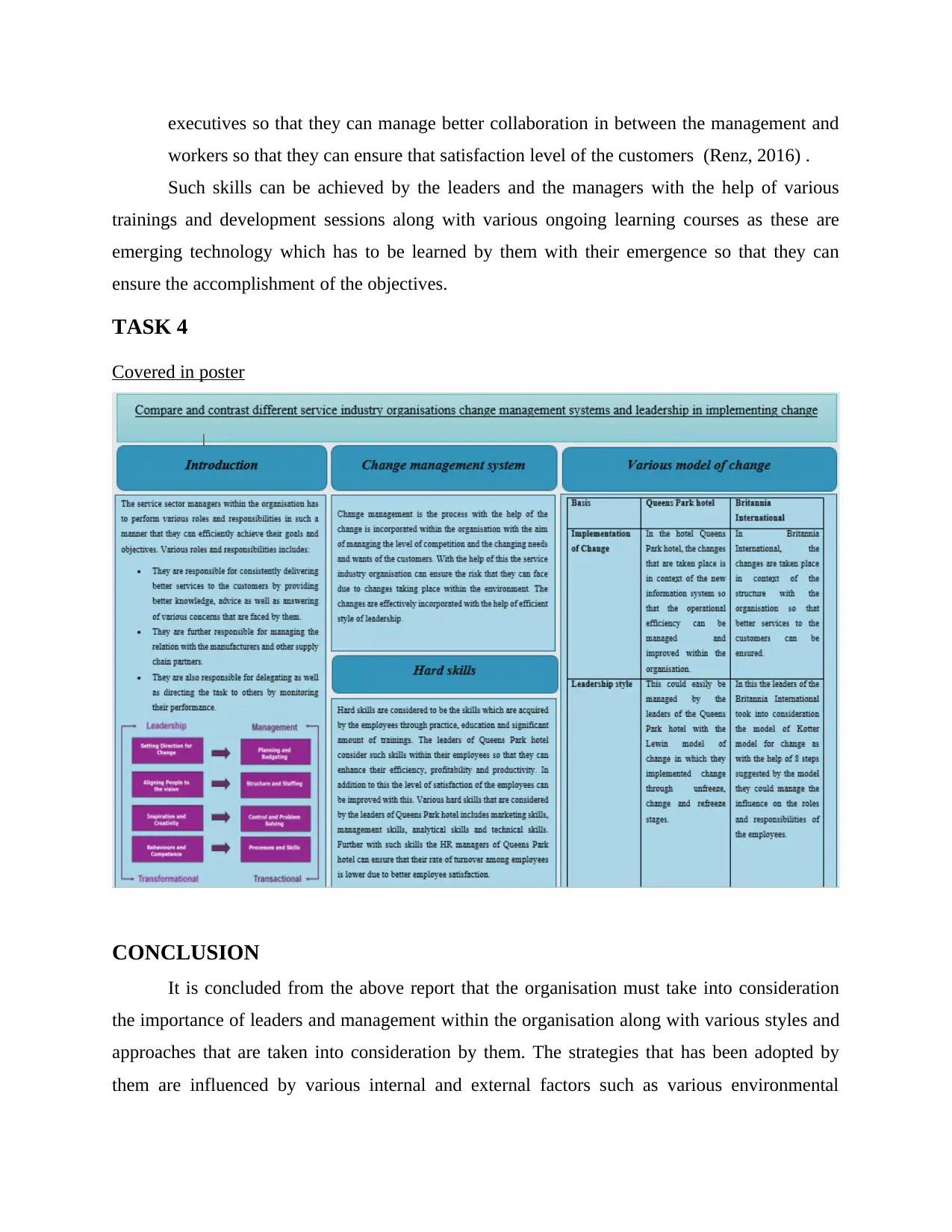
executives so that they can manage better collaboration in between the management and
workers so that they can ensure that satisfaction level of the customers (Renz, 2016) .
Such skills can be achieved by the leaders and the managers with the help of various
trainings and development sessions along with various ongoing learning courses as these are
emerging technology which has to be learned by them with their emergence so that they can
ensure the accomplishment of the objectives.
TASK 4
Covered in poster
CONCLUSION
It is concluded from the above report that the organisation must take into consideration
the importance of leaders and management within the organisation along with various styles and
approaches that are taken into consideration by them. The strategies that has been adopted by
them are influenced by various internal and external factors such as various environmental
workers so that they can ensure that satisfaction level of the customers (Renz, 2016) .
Such skills can be achieved by the leaders and the managers with the help of various
trainings and development sessions along with various ongoing learning courses as these are
emerging technology which has to be learned by them with their emergence so that they can
ensure the accomplishment of the objectives.
TASK 4
Covered in poster
CONCLUSION
It is concluded from the above report that the organisation must take into consideration
the importance of leaders and management within the organisation along with various styles and
approaches that are taken into consideration by them. The strategies that has been adopted by
them are influenced by various internal and external factors such as various environmental
Paraphrase This Document
Need a fresh take? Get an instant paraphrase of this document with our AI Paraphraser
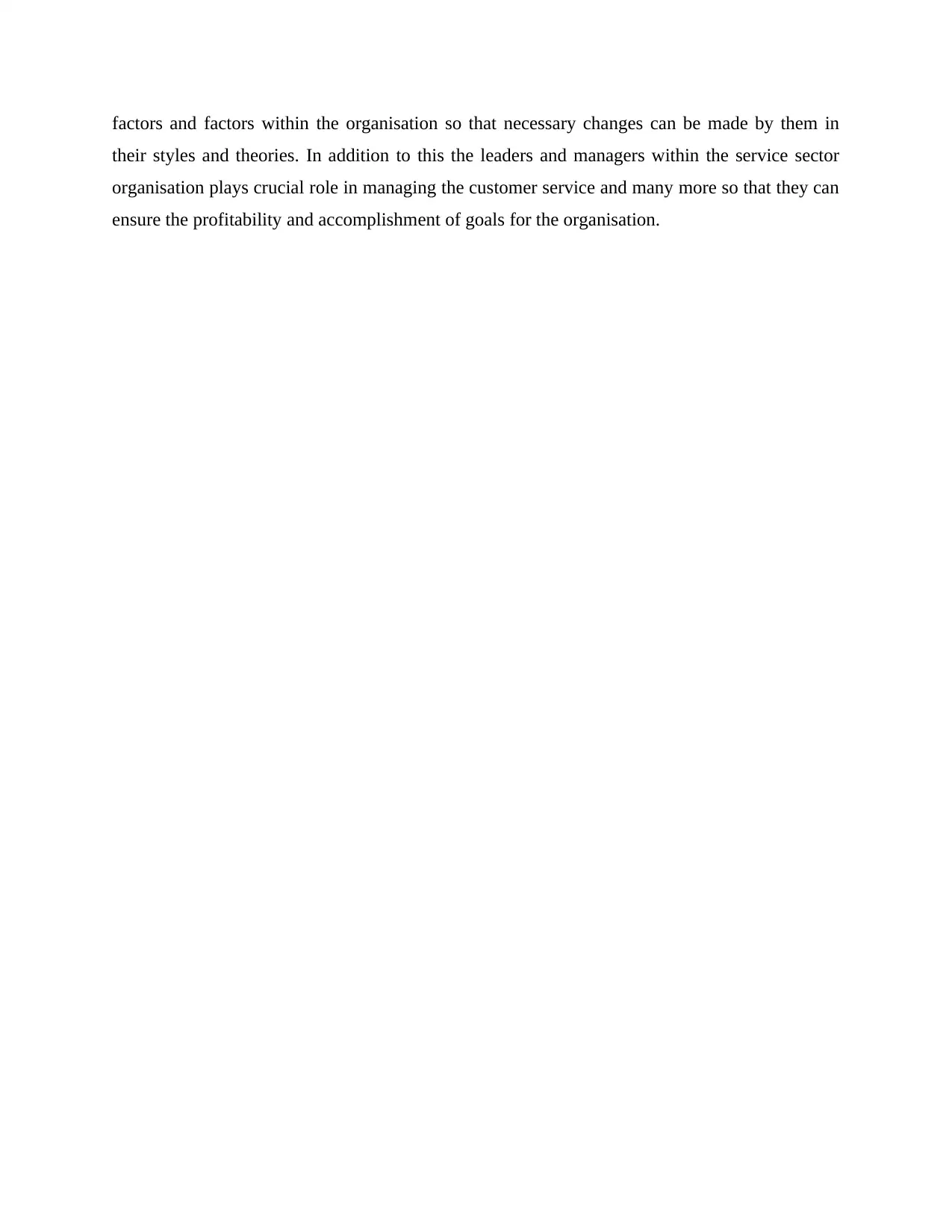
factors and factors within the organisation so that necessary changes can be made by them in
their styles and theories. In addition to this the leaders and managers within the service sector
organisation plays crucial role in managing the customer service and many more so that they can
ensure the profitability and accomplishment of goals for the organisation.
their styles and theories. In addition to this the leaders and managers within the service sector
organisation plays crucial role in managing the customer service and many more so that they can
ensure the profitability and accomplishment of goals for the organisation.
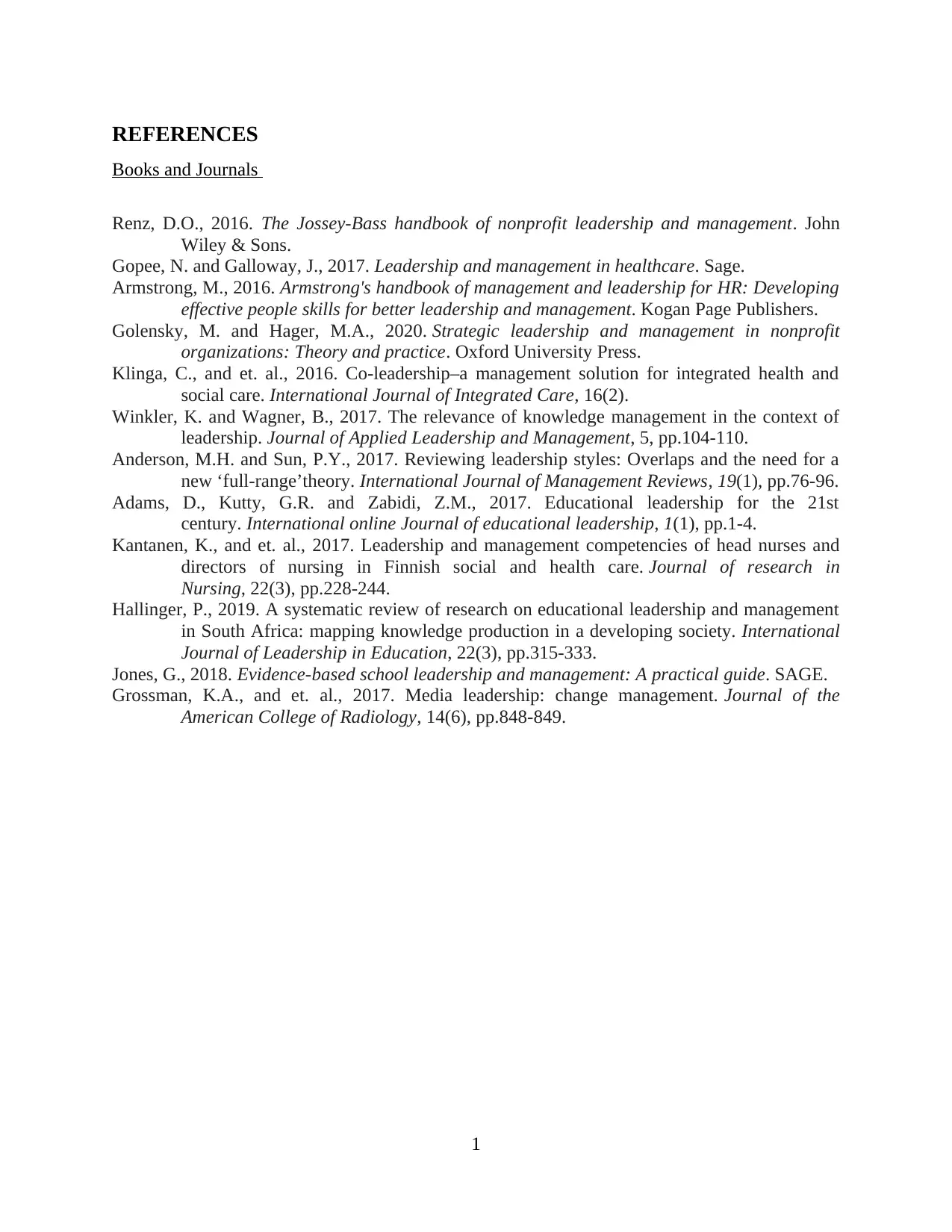
REFERENCES
Books and Journals
Renz, D.O., 2016. The Jossey-Bass handbook of nonprofit leadership and management. John
Wiley & Sons.
Gopee, N. and Galloway, J., 2017. Leadership and management in healthcare. Sage.
Armstrong, M., 2016. Armstrong's handbook of management and leadership for HR: Developing
effective people skills for better leadership and management. Kogan Page Publishers.
Golensky, M. and Hager, M.A., 2020. Strategic leadership and management in nonprofit
organizations: Theory and practice. Oxford University Press.
Klinga, C., and et. al., 2016. Co-leadership–a management solution for integrated health and
social care. International Journal of Integrated Care, 16(2).
Winkler, K. and Wagner, B., 2017. The relevance of knowledge management in the context of
leadership. Journal of Applied Leadership and Management, 5, pp.104-110.
Anderson, M.H. and Sun, P.Y., 2017. Reviewing leadership styles: Overlaps and the need for a
new ‘full‐range’theory. International Journal of Management Reviews, 19(1), pp.76-96.
Adams, D., Kutty, G.R. and Zabidi, Z.M., 2017. Educational leadership for the 21st
century. International online Journal of educational leadership, 1(1), pp.1-4.
Kantanen, K., and et. al., 2017. Leadership and management competencies of head nurses and
directors of nursing in Finnish social and health care. Journal of research in
Nursing, 22(3), pp.228-244.
Hallinger, P., 2019. A systematic review of research on educational leadership and management
in South Africa: mapping knowledge production in a developing society. International
Journal of Leadership in Education, 22(3), pp.315-333.
Jones, G., 2018. Evidence-based school leadership and management: A practical guide. SAGE.
Grossman, K.A., and et. al., 2017. Media leadership: change management. Journal of the
American College of Radiology, 14(6), pp.848-849.
1
Books and Journals
Renz, D.O., 2016. The Jossey-Bass handbook of nonprofit leadership and management. John
Wiley & Sons.
Gopee, N. and Galloway, J., 2017. Leadership and management in healthcare. Sage.
Armstrong, M., 2016. Armstrong's handbook of management and leadership for HR: Developing
effective people skills for better leadership and management. Kogan Page Publishers.
Golensky, M. and Hager, M.A., 2020. Strategic leadership and management in nonprofit
organizations: Theory and practice. Oxford University Press.
Klinga, C., and et. al., 2016. Co-leadership–a management solution for integrated health and
social care. International Journal of Integrated Care, 16(2).
Winkler, K. and Wagner, B., 2017. The relevance of knowledge management in the context of
leadership. Journal of Applied Leadership and Management, 5, pp.104-110.
Anderson, M.H. and Sun, P.Y., 2017. Reviewing leadership styles: Overlaps and the need for a
new ‘full‐range’theory. International Journal of Management Reviews, 19(1), pp.76-96.
Adams, D., Kutty, G.R. and Zabidi, Z.M., 2017. Educational leadership for the 21st
century. International online Journal of educational leadership, 1(1), pp.1-4.
Kantanen, K., and et. al., 2017. Leadership and management competencies of head nurses and
directors of nursing in Finnish social and health care. Journal of research in
Nursing, 22(3), pp.228-244.
Hallinger, P., 2019. A systematic review of research on educational leadership and management
in South Africa: mapping knowledge production in a developing society. International
Journal of Leadership in Education, 22(3), pp.315-333.
Jones, G., 2018. Evidence-based school leadership and management: A practical guide. SAGE.
Grossman, K.A., and et. al., 2017. Media leadership: change management. Journal of the
American College of Radiology, 14(6), pp.848-849.
1
⊘ This is a preview!⊘
Do you want full access?
Subscribe today to unlock all pages.

Trusted by 1+ million students worldwide
1 out of 12
Related Documents
Your All-in-One AI-Powered Toolkit for Academic Success.
+13062052269
info@desklib.com
Available 24*7 on WhatsApp / Email
![[object Object]](/_next/static/media/star-bottom.7253800d.svg)
Unlock your academic potential
Copyright © 2020–2025 A2Z Services. All Rights Reserved. Developed and managed by ZUCOL.


